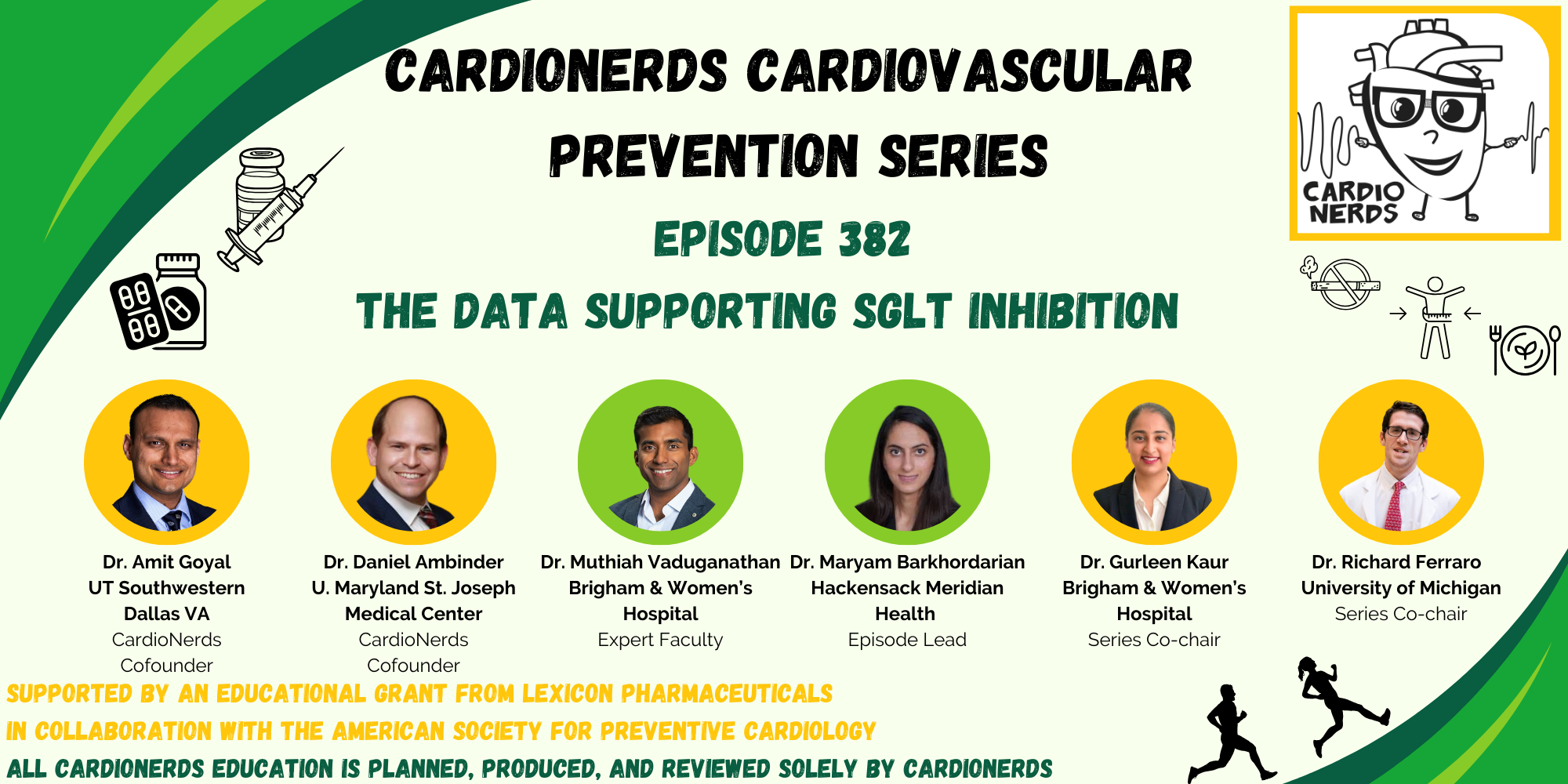
382. SGLT Inhibitors: The Data Supporting SGLT Inhibition with Dr. Muthiah Vaduganathan
Cardionerds: A Cardiology Podcast
Advancements in SGLT2 Inhibitors
This chapter explores the emergence and multifunctional benefits of SGLT2 inhibitors for treating type 2 diabetes, chronic kidney disease, and heart failure. It highlights ongoing research, personal experiences in cardiology, and the future of these therapies in improving patient outcomes and access to care.
CardioNerds Dr. Rick Ferraro, Dr. Gurleen Kaur, and Dr. Maryam Barkhordarian discuss the evidence and data supporting SGLT inhibition for cardiovascular and kidney health outcomes with expert faculty Dr. Muthu Vaduganathan. They discuss the role of SGLT inhibitors in different populations, including those with diabetes mellitus, heart failure, CKD, and myocardial infarction. Show notes and audio editing by CardioNerds Academy Fellow Dr. Maryam Barkhordarian.
This episode was produced in collaboration with the American Society of Preventive Cardiology (ASPC) with independent medical education grant support from Lexicon Pharmaceuticals.
US Cardiology Review is now the official journal of CardioNerds! Submit your manuscript here.

Pearls – The Data Supporting SGLT Inhibition with Dr. Muthiah Vaduganathan
- The benefit of SGLT inhibition extends beyond diabetes, and improves cardiovascular and kidney health outcomes independent of diabetes in appropriate patient populations.
- SGLT inhibition decreases cardiovascular mortality and heart failure hospitalization independent of left ventricular ejection fraction.
- SGLT inhibitors reduce clinically relevant events such as dialysis and transplantation in CKD patients irrespective of etiology and are now a cornerstone for the prevention of CKD progression.
- The introduction of polypills in heart failure can simplify GDMT implementation.
Show notes – The Data Supporting SGLT Inhibition with Dr. Muthiah Vaduganathan
How did SGLT inhibitors transition from “diabetes medication” to guideline-directed cardiovascular medicine?
- Most therapies in cardiology were developed for a particular purpose and ended up being indicated for a vastly different reason. The SGLT-2 inhibitors are no different.
- Cardiovascular safety concerns about diabetes medications led to a mandate to conduct cardiovascular outcomes trials for all novel diabetes medications. This federal requirement shed light on the cardiovascular benefits of SGLT inhibitors in patients with diabetes.
- These initial trials showed that not only are these medications safe but also, surprisingly, proved their role in preventing heart failure and delaying progression of chronic kidney disease.
What are the mechanisms of action of SGLT-2 and SGLT-1/2 inhibitors?
- The central mechanism(s) of how these medications confer health outcomes benefits patients is/are not well understood.
- The main organ involved in the action of SGLT-2 inhibitors is the kidney at the level of the proximal tubule, impacting the cardiovascular system by handling salt and water and improving kidney efficiency. Conversely, SGLT-1/2 inhibitors also act at the level of the gut, the predominant location of the SGLT-1 cotransporter.
- Their effects on the cardiovascular system are secondary, given there is no SGLT-1 or -2 cotransporters in the myocardium. These secondary effects can be impacted through blood pressure reduction, volume regulation, improved glycemic control, etc. to overall improve cardiovascular status.
- Whatever the underlying mechanisms, the empirical data for their use is strong and growing.
What is the role of SGLT inhibitors in preventing CKD progression?
- RAAS inhibitors (ACE inhibitors and ARBs) have been the cornerstone of CKD management for the past two to three decades.
- SGLT inhibitors have been the first add-on to this background therapy.
- Four trials, DAPA-CKD, EMPA-CKD, CREDENCE, and the SCORED, investigated the effects of SGLT-2 and SGLT-1/2 inhibitors in patients with CKD with or without diabetes.
- The outcomes of these trials include modifying the course of CKD and reducing events such as dialysis initiation and transplantation. These effects were regardless of participants’ diabetic status, CKD etiology, or individual patient profile.
- The addition of SGLT-2 inhibitors to ACEI or ARB can be considered as GDMT of CKD.
What is the role of SGLT-2 inhibitors in combination with other medications as polypill?
- Polypills have been beneficial in many areas such as cardiometabolic medicine, hypertension, and diabetes mellitus. In addition, a multi-drug regimen is strongly recommended in heart failure with reduced ejection fraction.
- Developing polypills in HFrEF has been challenging because adjacent compounds are not available in the armamentarium of sponsored pharmaceutical companies.
- Investigations of various polypills are underway for the management of heart failure.
References – The Data Supporting SGLT Inhibition with Dr. Muthiah Vaduganathan
- Heerspink HJL, Stefánsson BV, Correa-Rotter R, et al. Dapagliflozin in Patients with Chronic Kidney Disease. N Engl J Med. 2020;383(15):1436-1446. doi:10.1056/NEJMoa2024816
- The EMPA-KIDNEY Collaborative Group, Herrington WG, Staplin N, et al. Empagliflozin in Patients with Chronic Kidney Disease. N Engl J Med. 2023;388(2):117-127. doi:10.1056/NEJMoa2204233
- Perkovic V, Jardine MJ, Neal B, et al. Canagliflozin and Renal Outcomes in Type 2 Diabetes and Nephropathy. N Engl J Med. 2019;380(24):2295-2306. doi:10.1056/NEJMoa1811744
- Bhatt DL, Szarek M, Pitt B, et al. Sotagliflozin in Patients with Diabetes and Chronic Kidney Disease. N Engl J Med. 2021;384(2):129-139. doi:10.1056/NEJMoa2030186


